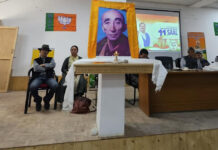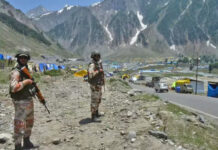President Ram Nath Kovind on Friday gave assent to a legislation for bifurcation of Jammu and Kashmir, and two Union Territories — Jammu and Kashmir, and Ladakh — will come into existence on October 31. The Parliament had earlier this week given its nod to the legislation for bifurcating the state, a bold and far-reaching decision that seeks to redraw the map and future of a region at the centre of a protracted militancy movement. The President has given assent to the Jammu and Kashmir Reorganisation Act, 2019, a home ministry official said. “In exercise of the powers conferred by clause (a) of section 2 of the Jammu and Kashmir Reorganisation Act, 2019 (34 of 2019), the Central Government hereby appoints the 31st day of October, 2019, as the appointed day for the purposes of the said Act,” a home ministry notification said. Three days after the far-reaching decision to abrogate the special status given to Jammu and Kashmir under Article 370 and bifurcate the state, Prime Minister Narendra Modi, in a nearly 40-minute televised address to the nation on Thursday, sought to assuage concerns of the people saying Jammu and Kashmir will not remain Union Territory for long. “As Jammu and Kashmir will see more and more development, I do not think it will remain Union Territory for long. Ladakh will remain a Union Territory,” Modi said. According to the legislation, the Union Territory of Jammu and Kashmir will have a legislature like Puducherry and Ladakh will be a UT like Chandigarh, without legislature. In both the Union Territories, key subjects such as law and order will be with the Centre. The UT of Jammu and Kashmir will have a Lieutenant Governor and the maximum strength of its assembly will be of 107 which will be enhanced to 114 after a delimitation exercise. Twenty-four seats of the Assembly will continue to remain vacant as they fall under Pakistan-occupied Kashmir (PoK). The current effective strength of the Jammu and Kashmir Assembly is 87, including four seats falling in Ladakh region, which will now be a separate UT without a legislature. The UT of Ladakh will have Kargil and Leh districts. The Act said Jammu and Kashmir UT will have reservation in the assembly seats. The Lieutenant Governor of the successor UT of J&K may nominate two members to the Legislative Assembly to give representation to women, if in his opinion, women are “not adequately” represented in the Legislative Assembly. It also said that the Lok Sabha will have five seats from the UT of J&K, while from Ladakh the Lower House of Parliament will have one seat.

Dogra Herald is the media of J & K, breaking language and geographical barriers, connecting J & K to the rest of India.
0191 245 4946
info@dograherald.com
Latest articles
BJP’s ‘400 paar’ claim creating doubts among people about democratic process, EVMs: Kanhaiya Kumar
NEW DELHI, Apr 13The BJP’s claim that it will win more than 400 seats in the Lok Sabha polls has created doubts...
NC stages strong protest against Pahalgam terror attack on tourists
DH NEWS SERVICEJAMMU, Apr 23The Jammu and Kashmir National Conference (JKNC) today staged a strong and vociferous protest against the barbaric killing...
Situation in J&K getting normal, detained leaders being released gradually: MHA to MPs
iamjkstarr - 0
Top Union Home Ministry officials told MPs of both the Houses of Parliament on Friday that the situation in the Union Territory of Jammu...


























